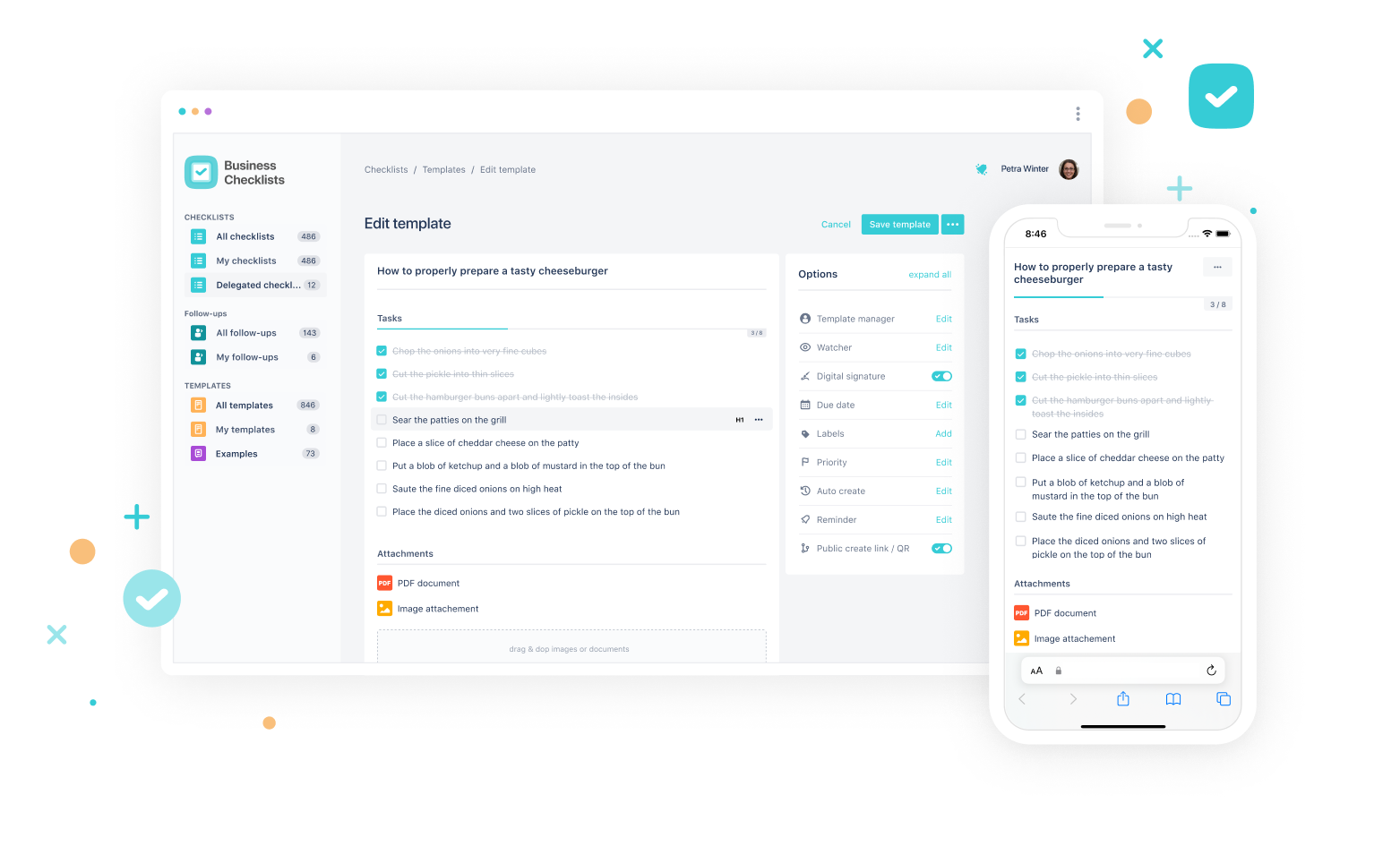The power of rituals that form corporate habits and drive quality in important processes. Or: how not to forget stuff anymore and become reliable as a team.
I used to get so angry. I'm sure you've been there as well. Someone forgot something, and it sucked. When you forget important things, it can have grave consequences. If you forget your keys in the office, you can't get back in. If you don't lock your car overnight, those expensive sunglasses you left in the glove compartment could be gone the next day. If you leave a meal cooking on the stove, well… let's just say that's not a good idea.
We know not to forget certain things. Some we have learned the hard way, which may be fine in your private life. But do you want every rookie on your team at work to make the same mistakes you once made?
A set of checklists for important processes in your business can help onboard new employees and instill reliability and quality in your value streams.
For example, if you run a hotel, you'll want to provide your guests with clean rooms and provide them with everything they need for their stay. You'd think that everyone knows how to clean a room, right? But why on earth do we all still check into rooms and find hairs under the pillows? And why do some guests find out that basic things are just missing, like shower gel or towels? Admittedly, a checklist will not make the problem go away entirely, but it would be a valuable step in the right direction if we started to reduce the number of errors significantly. If you’re a 5-star hotel, every prevented flaw goes a long way.
You get the point, even if you’re not in the hotel business. Your business model may even rely on cheap prices and cost-efficient procedures, but a checklist can also help make things leaner.
Who wants to use a checklist? That’s for other people. It's not my style
Checklists are not adopted easily and naturally. They feel awkward to a lot of people. I have heard people say "I am not a checklist type of person." countless times. It’s an excuse, just like "I am not a machine. I need my freedom and creativity". While it’s true that checklists often feel more unnecessary the more experienced people are, they're still a universal tool that works and sometimes even save lives. Would you want the pilot of the next plane you board to skip checklists because he has flown airplanes hundreds of times already? Or your surgeon to skip the WHO surgical safety checklist in an emergency room because he is "not that type of person" and "needs his creativity"?
The truth is more often than not that checklists are inconvenient, but they cost extra time. It’s a bureaucracy that feels unnecessary. It’s almost like an insult for a lot of people, to follow a recipe for a meal that they have cooked dozens of times already. Isn’t the recipe just for the first few times until you memorize the ingredients and necessary steps?
Precision in repetition: It’s about everyone in the team
It’s perfectly fine if the ratatouille that you enjoy with your family isn't exactly the same every time you make it. You may even like it that way. Got some leftovers? Throw them in. Awesome.
But that’s not how chefs in multiple Michelin-star restaurants cook their amazing dishes. That’s also not how McDonald’s does it. If you’re in a professional setting like a business, you cannot leave it to chance whether your recipe creates a dish fit for a king or can be thrown straight into the trash. Every step needs to follow the recipe precisely. Everything we know about a process should definitely not be left uncontrolled.
If you look at McDonald’s, you’ll understand that their procedures (and checklists) help them produce the same Big Mac over and over again everywhere in the world no matter the people, their background, or the circumstances. That’s how you want to run the complicated part of your business.
The difference between complicated and complex
Now, you may already be hearing that nagging voice in your head saying "Not everything can be solved with a checklist!" That’s absolutely true. And if you have been following me a little, you know that I work in an organization that is agile through and through. Our teams work autonomously. We are very transparent. We do not force checklists on people everywhere. Yet here I am promoting them like they're a gold mine for your team’s productivity? Yep.
There is just a little caveat. Do not use checklists for complex problems. If you try to solve something that is full of surprises with a checklist, you’ll most likely fail. Are you not sure how to reach the desired outcome? Don't use checklists. Do the requirements and criteria for success change quickly or are they unknown at this point? Nope. Is your goal not clearly defined? Are there two different outcomes that are both acceptable? Better not use checklists either. People say we’re living in a VUCA world. Volatile. Uncertain. Complex. Ambiguous.
Quick tip: If you deal with a complex problem always ask: “Who can solve this problem?” Never ask how. “How” drags you in the wrong direction with a VUCA problem.
Checklists are for the complicated world, and don’t be mistaken: while a lot of the innovation and new ideas lie in complex areas, all teams have to deal with complicated problems. A complicated problem can be answered with a “how” question: “How do I produce an iPhone?” While it’s incredibly complex to invent an iPhone and only a genius like Steve Jobs could do it, it’s rather simple to build one. Follow a recipe and you’ll get there.
All production processes can be categorized into three categories:
- Things you can fully automate.
- Things that are proven and known but that are not yet automated.
- Fully manual things with little or no recipe.
If you have full automation you may only need checklists for audits. Checklists work best when you already know what is a good process but there is no automation. You could argue that checklists try to automate human behavior, but that’s too short-sighted.
Checklists do help in a complex world as well, when they deal with the complicated parts. If you know that the minutiae are taken care of reliably, you can focus on your creativity. A checklist can free the way towards innovation. But checklists never lead to innovation. Checklists always codify what is already known. Checklists can help create context and circumstances, but humans solve the puzzles.
But how do we use checklists in a team?
The easiest and simplest way to use a checklist is paper. Jot down a couple of things and check them off. Once you find the right set of 'checks' you can print out your checklist and hand it over to your staff. And that’s how it’s done quite often. Have you seen the cleaning checklist in McDonald’s restrooms? The cleaning staff just checks it off and signs it.
There are a lot of challenges to such "dead processes". Documentation is hard. Analytics are unavailable. Compliance is often very low. Ultimately the added value is usually rather small and mostly dependent on management and keeping a good overview.
Some people think that putting such a checklist into a Google Spreadsheet and collecting the data on the web is already a digital transformation. But we’ve built a better way into Atlassian Cloud: Checklists for Jira and Confluence.
While we know from our experience as one of Atlassian’s biggest solution partners that Confluence and Jira, together with the Atlassian Cloud, can help customers in a complex world, our checklists now help with the complicated stuff as well. And it’s intertwined. You can have both in the same setting. Wanna try? Learn more about Checklists for Atlassian Jira and Confluence here. It’s free. If you have any further questions, don't hesitate to get in touch with us.





